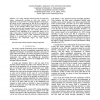Free Online Productivity Tools
i2Speak
i2Symbol
i2OCR
iTex2Img
iWeb2Print
iWeb2Shot
i2Type
iPdf2Split
iPdf2Merge
i2Bopomofo
i2Arabic
i2Style
i2Image
i2PDF
iLatex2Rtf
Sci2ools
117
click to vote
COMSWARE
2007
IEEE
2007
IEEE
On the Effects of Cooperation in DTNs
— In a Delay Tolerant Network (DTN) the nodes may behave autonomously deciding on their own whether to implement or not the rules of a routing algorithm. In this paper, the effects of node cooperation (or lack of it) are explored for three well-known routing algorithms proposed for DTNs with respect to the message delivery delay and the transmission overhead incurred until message delivery or the termination of the message spreading process. The results show that the sensitivity of the algorithms to the cooperation degree can be high, to the point of making them inferior to algorithms they typically outperform under a fully cooperative environment. Finally, it is demonstrated how a simple mechanism that incorporates the cooperation degree can help improve effectiveness.
Related Content
| Added | 02 Jun 2010 |
| Updated | 02 Jun 2010 |
| Type | Conference |
| Year | 2007 |
| Where | COMSWARE |
| Authors | Antonis Panagakis, Athanasios Vaios, Ioannis Stavrakakis |
Comments (0)

